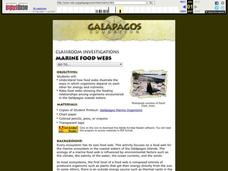Shelby County Schools
How Ecosystems Work
How does one organism get its energy? What is the main source of energy in an ecosystem? How does the flow of energy affect different types of ecosystems? Answer these questions with a fill-in-the-blank worksheet.
NOAA
An Ocean of Energy
Young biologists trace the path of the sun's energy through marine ecosystems in the second part of this four-lesson series. Building on prior knowledge about producers, consumers, and decomposers young scholars are introduced to the...
Curated OER
Ecosystems and Remote Sensing
Young scholars obtain remote sensing data to compare and contrast global biomass data with global temperature data.
NOAA
Ocean Primary Production
A cold seep is an area on the ocean floor where hydrocarbons leak from the earth, creating entire unique biomes. Learners explore cold seeps, photosynthesis in the ocean, and its limitations due to loss of sunlight. They further explore...
Curated OER
Energy Through the Ecosystem
In this ecosystem worksheet, students use a diagram of an ocean-based food web to complete 5 short answer questions about the energy flow through this ecosystem.
Consortium for Ocean Science Exploration and Engagement (COSEE)
Arctic Smorgasbord
Though the walrus spends roughly one third of its time on land, it eats organisms that live on the bottom of the ocean. The first in a series of five, the lesson uses a variety of plant and animal cards to have scholars build an arctic...
Curated OER
An Introduction to the Ocean World
Students comprehend how the organisms that exist within the ocean biome, and categorizing each into producer, consumer, or decomposer. They place various human actions under the headings of "hazard" or "help," illustrating how humans can...
Curated OER
Energy Flow in Ecosystems
Learners, in groups, create a slide show about the ecosystem and answer critical thinking questions based on their research.
University of Waikato
Build a Marine Food Web
Dive into a lesson on marine ecosystem interactions. Individuals learn about and devise a marine food web. The resource provides organism cards and pupils use article resources to discover interactions before modeling them in a food web.
University of California
Energy and Biomass Pyramids
Young scientists play tag as they act out the food pyramid in the ocean ecosystem. Energy circles pass from the smaller prey to the predators and at the end of the activity, a data chart and analysis questions allow pupils to apply their...
Curated OER
Imagine a Kelp Forest
Students write a story based on their research of the kelp forest. In this ecosystem lesson plan, students view a video and research the kelp forest ecosystem. They write a short story imagining the discovery of a new species in the kelp...
Forest Foundation
The Web of Life
Producers, herbivores, carnivores, omnivores, decomposers. To begin a study of the forest ecosystem, learners examine the connections among the members of ecological communities.
Curated OER
Ecology
Fourth graders research an ecosystem and its endangered species. They create a PowerPoint Presentation, oral report, poster or a booklet based on their research. They research on the internet and in biology texts in teams of 4.
Polar Trec
Bering Sea Fabulous Food Chain Game
In spring, the Bering Sea turns green due to phytoplankton, which live at the surface, experiencing a population explosion. Groups of scholars play a food chain game, writing down food chains as the game is played. After five to six...
Curated OER
Marine Debris
Learners perform experiments to examine if debris float, or blow in the wind. The effects of these characteristics on the marine debris are then discussed. They determine how a material can influence what becomes marine debris.
Curated OER
Marine Food Webs
Students examine how food webs illustrate the ways in which organisms depend on each other for energy and nutrients, and make food webs showing the feeding relationships among organisms encountered in the Gal??pagos coastal waters.
Curated OER
Chewin' in the Chesapeake
Students examine a web page on food webs and select a habitat to research. For this research lesson students identify the organisms found in the food web and present their findings to the class.
Curated OER
Food Web
Middle schoolers are able to define food web, and identify the interdependence of organisms within a system. They are able to describe how natural events and human activities can impact a food web.



















